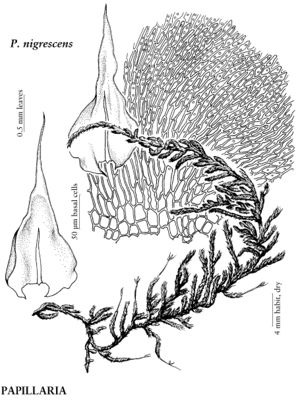Difference between revisions of "Papillaria nigrescens"
Ber. Thätigk. St. Gallischen Naturwiss. Ges. 1875 – 1876: 265. 1877.
FNA>Volume Importer |
FNA>Volume Importer |
||
| Line 18: | Line 18: | ||
|name=Papillaria nigrescens subsp. donnellii | |name=Papillaria nigrescens subsp. donnellii | ||
|authority=(Austin) Kindberg | |authority=(Austin) Kindberg | ||
| − | }}{{Treatment/ID/Synonym | + | }} {{Treatment/ID/Synonym |
|name=P. nigrescens var. donnellii | |name=P. nigrescens var. donnellii | ||
|authority=Austin | |authority=Austin | ||
| − | }}{{Treatment/ID/Synonym | + | }} {{Treatment/ID/Synonym |
|name=Tricholepis nigrescens | |name=Tricholepis nigrescens | ||
|authority=unknown | |authority=unknown | ||
| − | }}{{Treatment/ID/Synonym | + | }} {{Treatment/ID/Synonym |
|name=T. nigrescens var. donnellii | |name=T. nigrescens var. donnellii | ||
|authority=(Austin) Grout | |authority=(Austin) Grout | ||
| Line 41: | Line 41: | ||
|elevation=low elevations (0-10 m) | |elevation=low elevations (0-10 m) | ||
|distribution=Fla.;La.;Mexico;West Indies;Central America;South America. | |distribution=Fla.;La.;Mexico;West Indies;Central America;South America. | ||
| − | |discussion=<p>The stems and branches of Papillaria nigrescens are terete-foliate, dull, yellowish green, and often blackish in older portions. The plants creep over bark substrates and sometimes have elongate, irregularly branched, pendent branches. In some colonies of P. nigrescens, leaves of all plants have long, 1-seriate, filiform apices so that plants very much resemble Barbella pendula. Although perigonia are present in some specimens, no perichaetia or sporophytes have been found in plants from the flora area. Plants referred to as var. donnellii represent an apparently casually expressed form in which some branches lose their leaves, except for a tuft at the tip of the otherwise naked setalike branch. Papillaria nigrescens is common and often locally abundant throughout most of Florida, much less so in southern Louisiana.</p> | + | |discussion=<p>The stems and branches of <i>Papillaria nigrescens</i> are terete-foliate, dull, yellowish green, and often blackish in older portions. The plants creep over bark substrates and sometimes have elongate, irregularly branched, pendent branches. In some colonies of <i>P. nigrescens</i>, leaves of all plants have long, 1-seriate, filiform apices so that plants very much resemble <i>Barbella pendula</i>. Although perigonia are present in some specimens, no perichaetia or sporophytes have been found in plants from the flora area. Plants referred to as var. donnellii represent an apparently casually expressed form in which some branches lose their leaves, except for a tuft at the tip of the otherwise naked setalike branch. <i>Papillaria nigrescens</i> is common and often locally abundant throughout most of Florida, much less so in southern Louisiana.</p> |
|tables= | |tables= | ||
|references= | |references= | ||
| Line 64: | Line 64: | ||
|publication year=1877 | |publication year=1877 | ||
|special status=Selected by author to be illustrated | |special status=Selected by author to be illustrated | ||
| − | |source xml=https://jpend@bitbucket.org/aafc-mbb/fna-data-curation.git/src/ | + | |source xml=https://jpend@bitbucket.org/aafc-mbb/fna-data-curation.git/src/8f726806613d60c220dc4493de13607dd3150896/coarse_grained_fna_xml/V28/V28_750.xml |
|genus=Papillaria | |genus=Papillaria | ||
|species=Papillaria nigrescens | |species=Papillaria nigrescens | ||
Revision as of 17:07, 18 September 2019
Plants often black with age. Stems conspicuous, branches short or sometimes elongate, often some naked distally except for terminal tuft of leaves; branchlets often present in leaf axils, slender, fragile, flagelliform. Stem leaves concave, 1–1.5 mm; apex acute. Branch leaves acuminate, 1–1.5 mm; costa to mid leaf or longer; medial laminal cells 25–40 µm, papillae 4–6-seriate, on abaxial and adaxial surfaces, occasionally on sutures between adjacent cells. Sporophytes unknown.
Habitat: Tree bark in shaded humid hammocks and swamp forests, limestone, soil
Elevation: low elevations (0-10 m)
Distribution

Fla., La., Mexico, West Indies, Central America, South America.
Discussion
The stems and branches of Papillaria nigrescens are terete-foliate, dull, yellowish green, and often blackish in older portions. The plants creep over bark substrates and sometimes have elongate, irregularly branched, pendent branches. In some colonies of P. nigrescens, leaves of all plants have long, 1-seriate, filiform apices so that plants very much resemble Barbella pendula. Although perigonia are present in some specimens, no perichaetia or sporophytes have been found in plants from the flora area. Plants referred to as var. donnellii represent an apparently casually expressed form in which some branches lose their leaves, except for a tuft at the tip of the otherwise naked setalike branch. Papillaria nigrescens is common and often locally abundant throughout most of Florida, much less so in southern Louisiana.
Selected References
None.
